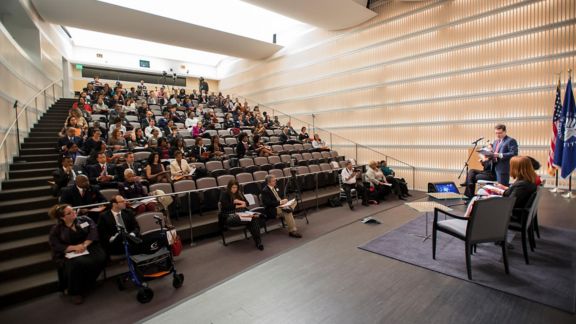Emerging Strategies to Improve Health Outcomes for People Aging with HIV

Problem
Since antiretroviral treatment (ART) regimens to treat HIV have become available, HIV is no longer seen as a death sentence.
However, as people with HIV age, new challenges have emerged for long-term survivors with HIV. Older adults with HIV (OAWH) experience the same health concerns as the general aging population but experience them earlier in life, more severely, and are at increased risk for and experience a vast host of comorbidities (e.g. cardiovascular disease, diabetes, osteoporosis), geriatric conditions (frailty, falls, neurocognitive impairment), and psychosocial needs (e.g. isolation, loneliness, lack of caregivers, and behavioral health). OAWH are also more likely to have late-stage HIV infection at diagnosis, and starting treatment late puts them at risk of greater immune system damage. Some OAWH may have complications due to different ART regimens over time. These conditions can intersect and overall, reduce the quality of life for OAWH.
Solution
NORC is helping HRSA and its grantees improve their services and the evidence base to support other providers.
The Health Resources and Services Administration (HRSA) HIV/AIDS Bureau (HAB) has invested in developing evidence-based and evidence-informed interventions to improve linkage to and retention in care and viral suppression for all people with HIV including older adults with HIV (OAWH). In 2022, they funded 10 demonstration sites to develop and implement interventions and strategies to improve OAWH health outcomes, supported by a Capacity-Building Provider (CBP).
NORC is supporting HAB by conducting a multi-site, mixed-methods, implementation science evaluation of the demonstration sites as well as an evaluation of the efforts of the CBP. NORC is also providing evaluation technical assistance to the demonstration sites to support the site-specific evaluation of emerging strategies. NORC’s evaluation will describe implementation successes and challenges and inform recommendations for replicating these strategies in other settings, as well as strengthening the evidence base for clinical and psychosocial services that improve the lives and health outcomes of OAWH.
Result
Our multi-site and site-specific implementation science evaluation will help HRSA and providers improve the lives of older adults with this chronic condition.
Data collection began in April 2023 and will continue through late 2024. We expect to learn which of the emerging strategies are associated with improvements in client-level outcomes. At the organizational level, we expect to learn which emerging strategies can be sustainably implemented in other clinical settings.
Related
Project Leads
-
Rich Dunville
Principal Research ScientistPrincipal Investigator -
Sarah Hodge
Research ScientistProject Manager








